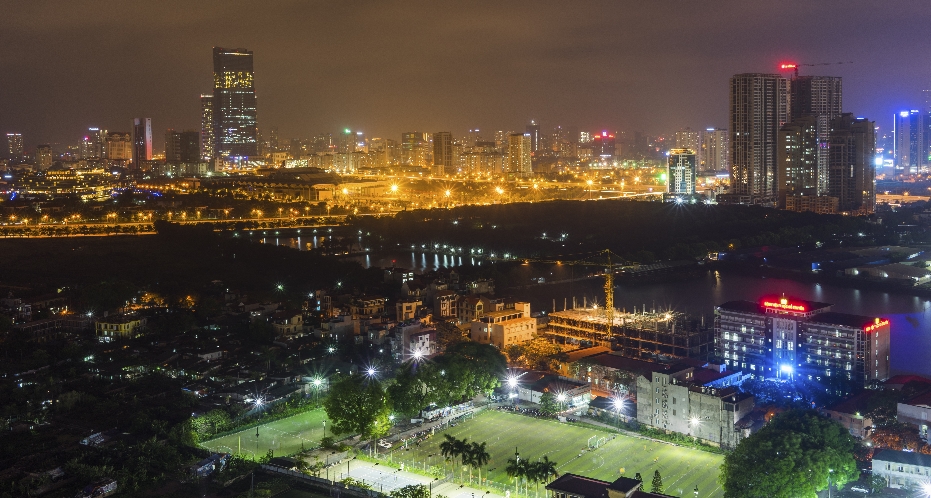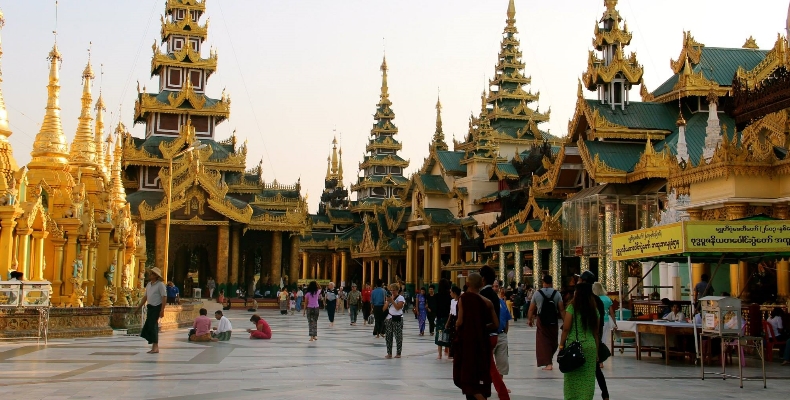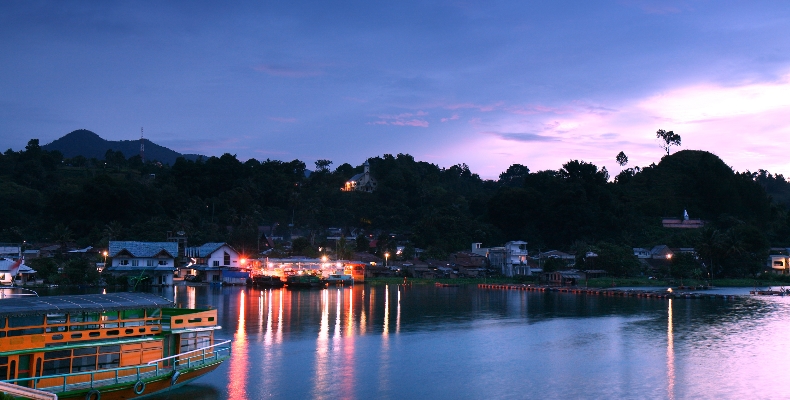Driving commercial and political engagement between Asia, the Middle East and Europe
Driving commercial and political engagement between Asia, the Middle East and Europe
Driving commercial and political engagement between Asia, the Middle East and Europe

The Philippines is the “success story” of the ASEAN (Association of Southeast Asian Nations) region and Vietnam has bright prospects but the economies of Thailand, Malaysia and Indonesia have all slowed down and face difficulties.
Yet with negotiations for a Regional Comprehensive Economic Partnership (RCEP) in process and the region’s rising middle classes and its urgent need for infrastructure, there remain plenty of investment opportunities for Western businesses.
Those were the views of The Economist’s Asia Editor Dominic Ziegler in an interview with Asia House ahead of the UK-ASEAN Dialogue conference taking place at Asia House on 13 October.
ASEAN is now the third largest economy in Asia and the seventh largest economy in the world. It has been the second fastest growing Asian economy over the past decade with a combined GDP of US$2.8 trillion in 2014 and a combined population of 625 million, almost twice the size of the USA and half of China’s. ASEAN’s purchasing power is expected to double within 15 years with an expanding middle class. But each country is at a different stage of economic development, has different political landscapes and they have all been affected by China and the world’s slowdown.
“I am not optimistic about Thailand,” Ziegler said.
In May 2014 the Royal Thai Army led by its Commander General Prayut Chan-o-cha, took control of Thailand in a military coup ousting the Thai prime minister Yingluck Shinawatra, following months of public unrest. The new military-led Government initially promised to change the Constitution and hold elections at the end of 2016. But the draft constitution was rejected by a military-appointed council in September 2015, so general elections have now been postponed to 2017. A new committee must now be appointed to write another draft of the Constitution, before it is sent for approval by the National Reform Council and put to the Thai public in a referendum.
“The rejection of the draft Constitution was extraordinary,” Ziegler said, “as the Council set up to examine it was hand-picked by the Government. That suggests this is what the generals wanted,” he said.
“The problem the Royal Thai Army has is that in the past when ordinary Thais have been allowed to vote in open and free elections they have voted in governments that the rich Thai elite disapprove of. So the coup in May last year saw an end to the dominance of the Shinawatra family. As a political force they are now smashed but the semblance of political calm is illusory because many Thais outside Bangkok are unhappy with the political establishment and the capital Bangkok gets vastly more fiscal resources than the rest of the country. Thailand has incredible over-centralisation and too little decentralisation. In the long run it’s not sustainable and that’s a fault line that runs through Thai society,” he said.
“One of the things the General said when they launched their military coup was that the political classes had been holding the economy back and they said they were going to get the trains running on time and get investment and that the problems were all because of the external environment. But the military-led Government has introduced a huge amount of uncertainty in terms of policies and policy–making and has instilled concerns in foreign investors.”
According to the World Bank Thailand’s economy is forecast to grow just 2.5 per cent this year and exports are expected to remain subdued. This means the country which grew at eight to nine percent per year during the late 1980s and early 1990s, will become the slowest growing country in ASEAN.
Ziegler said Thailand was not only affected by the China slowdown, but also a regional slowdown. “These ASEAN economies should have done much more to go up the value chain when times were good in terms of moving away from relying on exporting commodities. In the case of Thailand, it’s not very high up the value chain and it relies on cheap and illegal labour from Burma [also known as Myanmar]. Since 2011 [when the military dictatorship formally ended in Myanmar] a vast new low wage low cost hinterland opened up for the Thai industry in Burma,” he said.
He had mixed views about prospects in Myanmar, despite growth being 8.5 per cent last year, and its ongoing reforms.
The first free and open elections since 1990 are set to take place in Myanmar on 8 November and opposition leader Aung San Suu Kyi’s NLD party is expected to do well, he said. “But these elections are not likely to please any of the participants,” Ziegler explained.
“The military-backed ruling party the USDP will do worse than it hopes and the NLD will do better, but even if it does well Suu Kyi can’t be president because the constitution bars her,” he said.

Shwedagon Pagoda located in Yangon, Myanmar. Photograph by Samantha Deave
“If they win they can’t change the constitution as 25 per cent of government seats are reserved for the military and the USDP will have some seats. You need 75 per cent of the vote to change the constitution,” he added.
But he said the former chairman of the USDP Shwe Mann was quite close to Suu Kyi and if the NLD win there “may be a deal to have him first and her later on,” he said. It is Parliament who nominates the President not the electorate, he pointed out.
But he pointed out that ethnic groups would be unhappy as the ethnic vote “could get splintered” so they may not have as much influence as they would like.
“Some citizens may not have votes at all and be left out”, he said referring to the Rohingya who are officially stateless.
But he said other ethnic groups were living in conflict areas where no elections were being organised and the thousands of economic migrants working illegally in Thailand and Malaysia would also miss the chance to vote.
“Suu Kyi has been very remiss in not criticising the treatment of the Rohingya by the majority Buddhists because it would be bad for her vote if she did so,” he said.
“The West tends to think of these elections as the end of a happy road that began with Suu Kyi’s release and this is the final part where the country comes out of darkness into bursts of sunshine but that’s the wrong impression because many things remain unresolved such as the balance of power between the NLD and the government party and ethnic conflicts.
“But if you look at where the country was back in 2010 then there has been a dramatic transformation, especially compared to Thailand, which was until recently was the bright point in terms of democratic development, but you could not say that now.”
He was quite pessimistic about Malaysia’s prospects in the light of the 1MDB (1Malaysia Development Berhad) scandal which he said had spooked foreign investors. Allegations were made in various newspapers that funds from the strategic development company, owned by the Government of Malaysia, had ended up in the current prime minister Najib Razak’s bank account.
Mr Razak came into office promising economic reforms and a change to many of the old pro-bumitra policies [policies favouring the ethnic Malay majority introduced in the 1970s] and promising to tackle institutional cronyism and corruption despite the opposition at the last election winning more of the popular vote.
“He is not introducing the reforms that he promised and is appearing to be if not corrupt to have behaved in ways that need the kind of explaining he has failed to come up with such as how $US700 million (£450 million) appeared in his bank account.” Mr Razak has denied taking any money from 1MDB for personal gain.
As for the Malaysian economy, which is forecast to grow at just 4.7 per cent this year [having grown at 10 per cent in the mid 1990s], he said it had been hit by two “external things” – a slowdown in China exports and also a regional slowdown.
“There has been a softening in world trade which has hit Malaysia in terms of falling demand form the West. Both Thailand and Malaysia should have done more when commodities were booming to move to service industries, to modernise their manufacturing sectors and introduce more competitiveness,” he added.
“Most of the weakness of the ringitt [which fell to a 17-year low in August] is caused by political risk, which has returned with a vengeance to a country and that is due in a very big part to the way that the prime minister has governed. Foreign investors now have concerns about political risk in Malaysia,” he said.
“The prime minister has also played the race card which is a very dangerous thing to do and he seems to condone a particular type of politics,” he added.
He said the Indonesian Government should also have moved away from being so dependent on commodities.
“In Indonesia’s political world there is no lobby for open markets and unbridled foreign investment across the whole spectrum – there is no one arguing that case,” he said.
“To a greater or lesser degree every politician in Indonesia is an economic nationalist. The President Jokowi is calling for foreign investment especially in infrastructure but the environment is not welcoming to foreigners. Foreign investment can transform an economy that needs to move away from a dependence on commodities.”
He described Jokowi as “a very charismatic guy.”

Medan, the capital of North Sumatra in Indonesia and the largest city outside Java. Image credit: Tan Wei Ming/iStock/Thinkstock
“When he became President it sparked a great deal of enthusiasm. He has promised a lot in terms of anti-corruption and he is a pretty clean guy but rather like his predecessor Yudhoyono he has got a soft Javanese way so he is not giving as much clear direction as he should do in terms of the projects that need investment .
“Indonesia is a huge archipelago with a vast population and it needs a lot – much more infrastructure and more vim and vigour – to pull it together,” he said.
Vietnam has at least got a boost from the TPP deal, he pointed out. [Vietnam is one of four ASEAN members taking part in negotiations for the Trans-Pacific Partnership (TPP) proposed regional free trade agreement (FTA) between 12 countries that includes the USA].
“I don’t know when Vietnam will get to the details in terms of the TPP acting on an external level with economic infrastructure in the country but it has got to help to some extent in terms of leveraging a level playing field so that private firms are kept on a more equal footing with state behemoths.”
He said that the Philippines had been the “success story” partly because of catching up with other economies but partly because of English language capability being strong and being able to tap into the BPO (business process outsourcing) sector. “When President Aquino came into office there was a sense of optimism that this would much less of a crony style economy,” he said.
He pointed out that the Philippines economy had boomed “without the kind of Chinese investment that other economies in the region have got.” He said that was because Aquino took a firm robust policy towards China “particularly towards its claims in the South China Sea”.
“It has taken China to an international tribunal arguing that the basis of their claims is not founded. Other countries in the region have been more timid,” he pointed out.
In May 2016 Aquino steps down and a new president will be elected.
“The Chinese are telling Filipino and Chinese ethic business people in the Philippines that when he goes, if someone acceptable replaces him there will be more Chinese investment in the economy and more opportunities in China for Filipino businesses,” he said.
The whole ASEAN region is dependent to some extent on global trade and some leverage that better than others such as Singapore, he said.
He said Singapore worked “even if you don’t approve of the electoral system in which the opposition does not have a look in.”
“Even the opposition does not want to be in power,” he continued. “The ruling party PAP got a shock in the last election when it won a record high number of votes on the back of a sense of pride in the country which this year celebrates its the 50th anniversary of Singapore.”
He said the Singapore public was concerned about the rising cost of houses and living and rate of immigration so the PAP had slowed the rate of immigration. “But I would not be at all surprised if they go back to their previous high rates of immigration,” he said.
Cambodia has low-wage labour and “there is the prospect of a slightly better political climate” he said. “At the last election the opposition disputed the claimed victory of Hun Sen but recently the opposition seems to have struck a deal with Hun Sen and as far as I can tell from this distance it is looking like there will be a relatively peaceful political environment, which is what it needs.”
Brunei has been badly affected by the drop in oil prices, he said. “But it has an efficient safety valve in that a lot of the working population are foreigners so it can bear the brunt of any slowdown as lots of foreigners are leaving,” he added.
“During the boom years it was in surplus but the budget is about to go into deficit.” He said the government also has plans to boost tourism. “I don’t see quite how it is going to do that whilst at the same time having a firmer Muslim stance.” It is also promoting the Halal industries, he added.
Ziegler said he was waiting to see the details of the TPP was but the concern was it did not include a big country like China. But the Regional Comprehensive Economic Partnership (RCEP) did. “That offers a way you can combine the RCEP and TPP and then you have something quite considerable,” he said.
ASEAN is presently negotiating the RCEP, a mega FTA, between the 10 Member States of ASEAN and the six nations that it has existing FTAs with (Australia, China, India, Japan, South Korea and New Zealand). It is known as ASEAN plus Six. Once concluded, the envisaged RCEP will account for about 30 per cent of global GDP.
Nevertheless there remain huge needs for infrastructure across the region. “The Asian Infrastructure Investment Bank (AIIB) is welcomed but it’s still a drop in the ocean compared to the needs that are there. No institution can supply all that is required and so the majority is going to have to be provided by the private sector. The AIIB a creation outside Bretton Woods Institutions but there is no reason they should not work together,” he surmised.
“The huge infrastructure demands in ASEAN should be of interest to Western businesses , as should the fast urbanising middle classes and I’m sure they are of interest to retail groups. I don’t know how easy it is to replicate a business across the different countries because you face the problem of dealing with 10 sets of judiciaries and regulations. “
Regarding the launch of the ASEAN Economic Community (AEC) at the end of 2015, he said western businesses would not see a lot of visible change.
“It’s more of a process. The launch is not the end station. It will all take place in ASEAN’s own sweet time. The question is whether you move at the pace of the slowest in the group and rely on consensus. But there are a lot of things they could do at a practical level now like making customs procedures easier and allowing driving licence to be used in each country.”
naomi.canton@asiahouse.co.uk
Speakers at UK-ASEAN Dialogue conference include the Secretary of State for Business, Innovation and Skills Rt Hon Sajid Javid MP, former Labour Cabinet Minister Lord Mandelson, Chairman of CIMB Group Nazir Razak and Group CEO of AirAsia Tony Fernandes. For more information click here.
What’s your view? Let us know on Twitter @asiahouseuk.
To read more stories on ASEAN click here.
